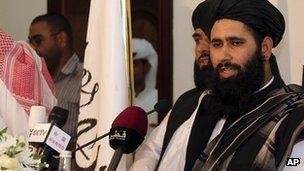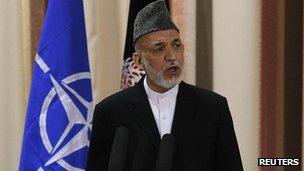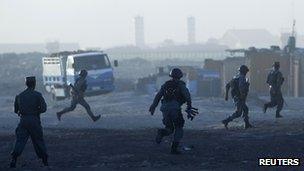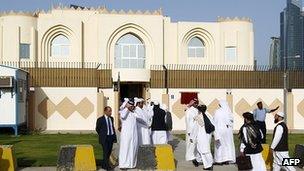Q&A: Afghan Taliban open Doha office
- Published

Taliban spokesman Mohammed Naeem said the group wanted to talks to Afghans
The Taliban have opened their first official overseas office in the Qatari capital, Doha, saying that one of their main aims was to "meet Afghans".
The group has long refused to meet Afghan President Hamid Karzai or his government, branding them puppets of the US.
This office is the first step for expected peace talks which many hope will take place despite the many obstacles, as the BBC World Service's Dawood Azami explains.
Who is involved and where?
The main parties are the Afghan government and its High Peace Council, the US and the Taliban. There have been meetings between Taliban representatives and US officials over the past two years.
The Taliban have also sent their representatives to conferences on Afghanistan in Germany, Japan, and France but if talks proceed this would be the first time the group has met Afghan government representatives for direct talks.
From now on, the Taliban will have a known address and authorised representatives who can openly talk, meet and travel. The Qatar office means the Taliban are no longer only a fighting group, but have a political arm too.
Why do the Taliban need a Qatar office?
Taliban representatives have been in Qatar for more than a year and are said to number more than 20.
For years, the Afghan government and its Western backers were trying to contact the Taliban who didn't have a known address.
Meetings aimed at resolving the Afghan conflict peacefully took in hotels or similar venues in various countries. But as a confidence-building measure, and as a way of providing security for Taliban leaders to participate in talks, finding them a permanent address became a priority.
Allowing the Taliban to open an office in Turkey, Qatar, UAE or Saudi Arabia were possible measures. The Taliban's preferred venue was Qatar because they considered it to be neutral. The US was also happy with the Qatar option.
What are the main obstacles?
Within hours of the Taliban office opening Mr Karzai raised his concerns about the peace process not being Afghan-led. He suspended plans for Afghan officials to meet the Taliban in Qatar, underlining how fraught the process will be.
His concerns were so great that US Secretary of State John Kerry had to promise that the Taliban flag and their sign reading The Islamic Emirate of Afghanistan would be removed. The flag remains, albeit on a shorter flagpole.
There are other obstacles.
The first is that the Taliban insist on the complete withdrawal of foreign forces as a pre-condition to becoming part of a political settlement.

President Hamid Karzai said the security handover was a "great day" for Afghanistan
Nato's combat troops are due to leave the country by the end of 2014, but the US plans to station forces after that as part of a bilateral security agreement. Details are still to be agreed by Kabul and Washington.
The shape of the future Afghan government is another issue over which the parties disagree.
Another possible obstacle comes from civil groups and women's rights activists who fear a political settlement resulting in the Taliban's inclusion in the Afghan government would mean limitations on their freedoms.
The official opening of the Taliban's office was delayed because President Karzai was concerned it could be used for recruitment, fundraising and making contacts with other countries. He was looking for guarantees the office would only be used for peace talks.
Mr Karzai visited Qatar twice this year and on his latest trip Qatar reportedly accepted his demands for guarantees. These included that:
Talks should eventually move to Afghanistan
Talks should result in the ending of violence in Afghanistan
The Taliban office should not become a venue for other countries to exploit or use for their own interests
What are the main aims of the three parties?
The White House set two conditions: that the Taliban make a statement supporting a peace process and they also want to prohibit the use of Afghan soil to threaten other countries.
Taliban leaders, most of whom have been subject to UN sanctions, see this as an opportunity to come in from the cold and present their case to the world.
Apart from the withdrawal of foreign forces, the Taliban also want the release of at least some prisoners from Guantanamo and Afghan jails, as well as the removal of the remaining leaders on the sanction list.

Afghan troops now tackle Taliban attacks like this one in Kabul on 10 June
The Afghan government hopes it will be able to meet the Taliban directly without the involvement of a third party, such as Pakistan.
US and Afghan leaders want the Taliban to join the Afghan government as a result of the peace process, without losing the achievements of the past decade.
The peace talks will succeed, the Americans say, when the Taliban finally sever all ties with al-Qaeda, end violence and accept the Afghan constitution, including its protections for women and minorities.
Have there been previous attempts at negotiation?
President Karzai has long called on the Taliban to join the peace process. In late 2008 he even offered to provide security for the Taliban supreme leader, Mullah Omar, if he agreed to peace talks - this was not incentive enough.
But while the government's efforts were focused on re-integrating Taliban fighters, they did not have a reconciliation strategy.
The High Peace Council was established in 2010 and tasked with contacting the Taliban and convincing them to join the peace process.
Sporadic contacts were made with a number of Taliban leaders but it did not have the desired outcome of provoking large-scale desertions.
In turn, the Taliban did not trust the Afghan government and considered it a "puppet" of the US.
The idea of engaging with the Taliban was initially controversial in the West but the idea of seriously engaging with the militants was explored at a 2011 peace conference.
Are the Taliban now happy to talk to Afghan leaders?
The Taliban have for years refused to speak to the Afghan government or members of the High Peace Council. They insisted that they wanted to talk to the US - which they called "the main party in the conflict".
But the Taliban's statement as they opened their office says one of the main aims of the Doha office is "to meet Afghans".
Although there was no recognition of President Karzai or his government and just a vague promise to talk to Afghans, "if necessary", that is still being read as an important shift.
Does Pakistan have a role?
Pakistan was one of the Taliban's main supporters from when it was launched in Kandahar in 1994 until the fall of the regime in 2001. Most of the Taliban's leaders reportedly then fled to Pakistan.
Taliban representatives reportedly went to Qatar from Pakistan and the group is still considered to be heavily dependent on the support of certain elements in the country - although this has its limits.
Pakistan's co-operation will probably prove critical to convince or pressurise the Taliban to reach a political settlement.

Hamid Karzai wanted guarantees about the Taliban's new office in Doha
So, talks are as much between Afghanistan and Pakistan as they are between the Afghan government and the Taliban.
President Karzai has reached out to Islamabad and Pakistan has been involved in background talks over the office in Qatar.
Pakistani officials generally say Islamabad wants a "friendly, peaceful and sovereign" Afghanistan. But they are adamant that Pakistan's "legitimate interests" in Afghanistan must be recognised after the withdrawal of Nato troops.